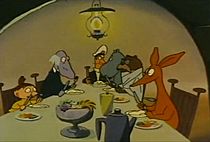Moomin (1969 TV series) facts for kids
| Moomin | |

Image from the TV series displaying the main characters
|
|
Quick facts for kids ムーミン(Mūmin) |
|
|---|---|
| Genre | Fantasy |
| Anime television series | |
| Directed by | Masaaki Osumi (Eps 1-26) Noboru Ishiguro, Satoshi Dezaki, Ryosuke Takahashi, Rintaro (Eps 27–65) |
| Written by | Tadaaki Yamazaki et. al. |
| Music by | Composer/songwriter: Seiichirō Uno Singer: Toshiko Fujita (opening/closing song: "Nē! Mūmin" (Hi, Moomin!)) |
| Studio | Tokyo Movie Shinsha (Eps 1-26) Mushi Productions (Tezuka Productions formerly) (Eps 27–65) Zuiyo Eizo (Now Nippon Animation) |
| Network | Fuji TV |
| English network | BBC |
| Original run | October 5, 1969 – December 27, 1970 |
| Episodes | 65 |
Moomin (ムーミン, Mūmin) is a Japanese anime (animated TV show) that aired on Fuji Television from 1969 to 1970. This series is based on the popular Moomin books by the Finnish author Tove Jansson.
A follow-up series called Shin Muumin was released in 1972. However, Tove Jansson, the creator of Moomin, did not approve of these TV shows. She felt they changed the stories, the feeling of the world, and the characters' personalities too much.
This 1969 Moomin series was never translated into other languages or shown outside Japan. It is very different from the later Moomin anime series from the 1990s. The 1990s series was shown in many countries and stayed much closer to the original Moomin books and comic strips.
Contents
About the Moomin TV Series
The 1969 Moomin TV series had two main parts, made by different animation studios. The first part is known as the "Tokyo Movie version." The second part is called the "Mushi Pro version."
The Tokyo Movie Version
The first 26 episodes were made by Tokyo Movie Shinsha. In this version, Moomintroll, the main character, was shown as a regular boy. He would sometimes fight or act a bit sneaky. Also, characters like Snufkin were shown doing things like driving cars.
Tove Jansson, the original author, was not happy with these changes. She famously said, "My Moomin is not a driver, fighter, or money maker." Even though the series was popular for its adventures and comedy, it was very different from her books.
Because of these big differences, Tokyo Movie's contract was ended. The way the characters looked was also changed.
The Mushi Pro Version
After Tokyo Movie, Mushi Productions took over making the series. This second part of the series had episodes that were much more like the original Moomin stories. They included elements of mystery, horror, comedy, and even sad moments from the books.
Even with these changes, Tove Jansson still did not fully approve of the show. Because of this, the series was eventually stopped after 65 episodes.
Episodes of Moomin
The 1969 Moomin series had a total of 65 episodes. Each episode told a new story, often with adventures and challenges for Moomintroll and his friends. Some of the episode titles included:
- "The Secret of the Silk Hat"
- "Rain! Storm!! Flood!!!"
- "Where is the Wonderful Spring?"
- "Good-bye, Gao-Gao"
- "Train Great Robber of Moomin Valley"
- "Ninny Who Lost a Face"
- "Small, Great Adventure"
- "Haunted House in the Forest"
- "The Secret of Nyoro-Nyoro"
- "Good Night, Moomin"

